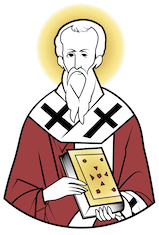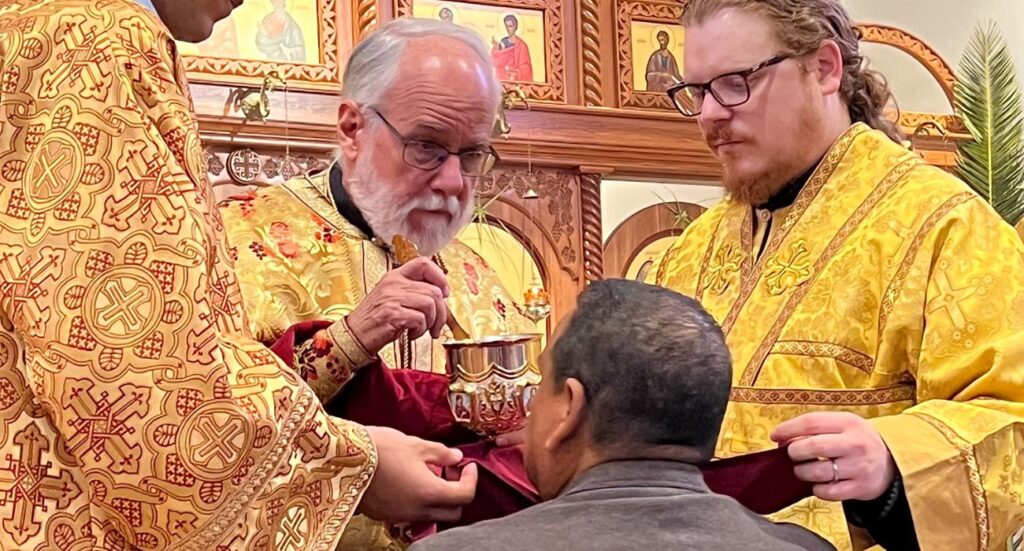Welcome to the website of Saint James Antiochian Orthodox Church! We are an Orthodox Christian community with members of many different nationalities, from all walks of life and ages, located in Modesto, California.
Whether you are a guest, an inquirer, or a visitor from another parish, we are pleased you are here. The purpose of our website is to introduce you to our parish community and to provide you with a brief overview of the Orthodox Church and faith. Our clergy are also personally available to answer any questions you may have about Orthodox Christianity, your spiritual experience, or your personal faith journey.
As a visitor to Saint James, we want you to be as comfortable as possible on your visit with us. This section covers some of the practical questions you may have as a newcomer or inquirer. In addition, some of these questions and others are covered more extensively in some of the other sections.
Are non-Orthodox Visitors Welcome?
Yes! Our community includes many converts to the Orthodox Church, and we are very comfortable with newcomers, inquirers, and visitors. The Orthodox Church includes faithful from all racial, age, ethnic, and economic backgrounds. Every sincere lover or seeker of Christ or non-Christian inquirer is welcome. We can probably anticipate many of your questions about the Orthodox Christian faith. So don’t be afraid to ask questions about what we do and why (at the appropriate time, of course!). Our bookstore also has books and pamphlets that can help answer a variety of questions. Subjects in our bookstore include Christian church history, theology, catechism, Orthodox spirituality, inspiration, prayer, the lives of the Saints, and stories about others who have journeyed to the Orthodox Faith.
What to expect?
As you enter the church building, you will find yourself in the entry hall, what we call the narthex. If you visit on a Sunday, a greeter will welcome you, hand you a bulletin and a service book, and help you navigate your way around. From the narthex, you’ll enter the church nave, the sacred space where the congregation worships. Our normal Sunday service is the Divine Liturgy of Saint John Chrysostom which is the liturgical service followed by all Orthodox Churches worldwide. You may follow the service text, or, if you prefer, simply close your eyes and enter into the Church’s beautiful worship of God.
Following the Sunday Divine Liturgy, you are invited to join us for a “coffee hour” which is a good time to get to know our parish members and meet our clergy. If you are not interested in social interaction at first, that’s fine. You are always welcome to follow your own pace and level of interest.
Will anything be required of me during a service that I need to know?
No. At Saint James, we do not take a collection or ‘pass the plate’. We do not have ‘altar calls’ or anything that should make you uncomfortable. Just open your mind, eyes, ears, and heart and join with us in praise of our Creator. Please be aware that Orthodox priests may only serve the Holy Eucharist to baptized members in good standing of the canonical Orthodox Church, who have recently confessed, and fasted before partaking of the Holy Eucharist. This is the ancient tradition of the Holy Church for nearly 2,000 years of its history. The Orthodox Church understands the Holy Eucharist as a mystery of the real presence of Christ in the Eucharist, not simply as a memorial, or merely in a spiritual sense, as many other non-Orthodox Christians do. Rather than trying to accommodate to often varying “interpretations” or revisions of this and other doctrines of the ancient faith, we simply ask that you respect the ancient, apostolic tradition and join us in receiving a piece of Fellowship bread at the veneration of the cross, at the end of the Divine Liturgy. Partaking of the Fellowship bread is an expression of friendship – is not the Eucharist.
How long are the services?
Great Vespers (Evening prayers – Saturday nights at 6:00 P.M.) are usually 45- 50 minutes in length.
Matins (Morning prayers – Sunday mornings at 9:00 A.M., preceding Divine Liturgy) averages 60 minutes in length.
Divine Liturgy (Sunday – 10:00 A.M.) runs about ninety minutes. We think that when you have participated in an Orthodox service you will feel like – as one visitor put it – “you have truly worshipped God!”
Is there a dress code?
The general rule for men and women is to dress appropriately, modestly and respectfully, because we stand before the living God. Visitors however wear everything from jeans to suits, long dresses to skirts, tee shirts to shirts with ties, dress shoes to sneakers. We ask, however, that you do not wear shorts, mini-skirts, tank tops, low-cut or strapless dresses (unless covered by a sweater, etc.). Some Orthodox women wear head coverings, but this is not required. Men are asked not to wear head coverings (baseball caps, etc.) in the nave.
Is childcare provided?
Each parent is responsible to take care of their child. We encourage children to be present in Church for the services. This participation is part of a child’s spiritual formation. As a matter of courtesy and respect for the other worshippers, if your baby or child gets fussy, talkative, or has a meltdown, please take him or her out of the nave until he or she is ready to return quietly.
Standing or sitting?
The traditional posture for prayer and worship in the Orthodox Church is to stand before the King of the universe! In the Orthodox “old countries” there are typically no pews in the churches. Chairs or benches on the side walls are usually reserved for the elderly and infirm. In North America however we tend to build our churches with pews or chairs. So you are free to sit. However, it is appropriate to stand during the Gospel reading, the Little and Great Entrances, the distribution of Holy Communion, when the priest gives a blessing, and at the Dismissal. Just follow the congregation.
Lighting candles?
Lighting candles is an important part of Orthodox worship and piety. We light candles as we pray, making an offering to God accompany our prayers. Orthodox typically light candles when coming into the church, but there are times when candles should not be lit. Candles should not be lit during the Epistle or Gospel readings, during the Little Entrance, and during the sermon. By the way, you do not have to be an Orthodox Christian to light a candle and pray in an Orthodox church
Can non-Orthodox receive the Holy Eucharist?
Orthodox priests may only serve the Holy Eucharist to baptized members in good standing of the canonical Orthodox Church, who have recently confessed, and fasted before partaking of the Holy Eucharist. This is the ancient tradition of the Holy Church for nearly 2,000 years of its history. The Orthodox Church understands the Holy Eucharist as a mystery of the real presence of Christ in the Eucharist, not simply as a memorial, or merely in a spiritual sense, as many other non-Orthodox Christians do. Rather than trying to accommodate to often varying “interpretations” or revisions of this and other doctrines of the ancient faith, we simply ask that you respect the ancient, apostolic tradition and join us in receiving the Fellowship bread at the veneration of the cross, at the end of the Divine Liturgy. Partaking of the Fellowship bread is an expression of friendship – is not the Eucharist.
What is Orthodox worship music like?
Close to seventy-five percent of an Orthodox service is sung. Traditionally, Orthodox do not use musical instruments. Usually, a choir leads the people in acapella harmony, with the level of congregational response varying from parish to parish. The style of music varies as well, from very traditional Byzantine-sounding chant in some parishes to more Western-sounding four-part harmony in a Russian church, with lots of variation in between. The music is solemn, prayerful, and intended to lead the faithful to worship the living God.
New visitors will find there are many new things to experience in a Holy Orthodox Church service. Feel free to go at your own pace, ask any questions you want, and know you are most welcome to “come and see”.
What if I have further questions?
Feel free to contact us, or talk to one of our faithful, or one of our clergy after the service or during coffee hour following Sunday Divine Liturgy. If your need is of a pastoral nature, you can call the office or leave an email request to schedule an appointment to meet with Father Thomas.
You might be interested in our pages about the Orthodox faith, written for fellow Christians and for non-Christians seekers and inquirers.
- FAQ for fellow Christians (opens new tab)
- FAQ for non-Christian inquirers and seekers (opens new tab)
- Twelve Things I wish I Had Known… (opens new tab)


